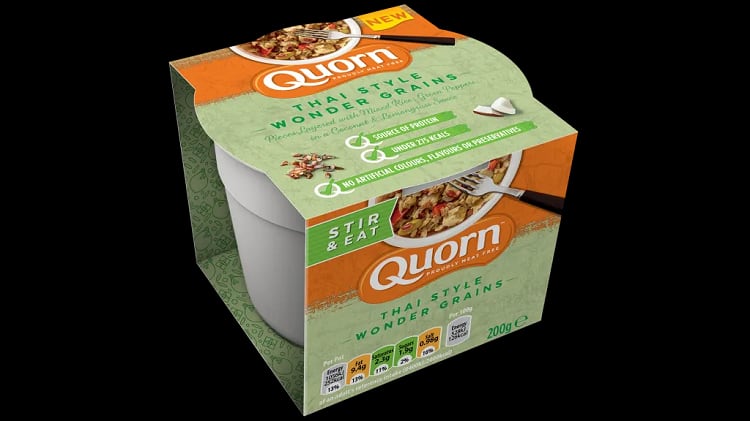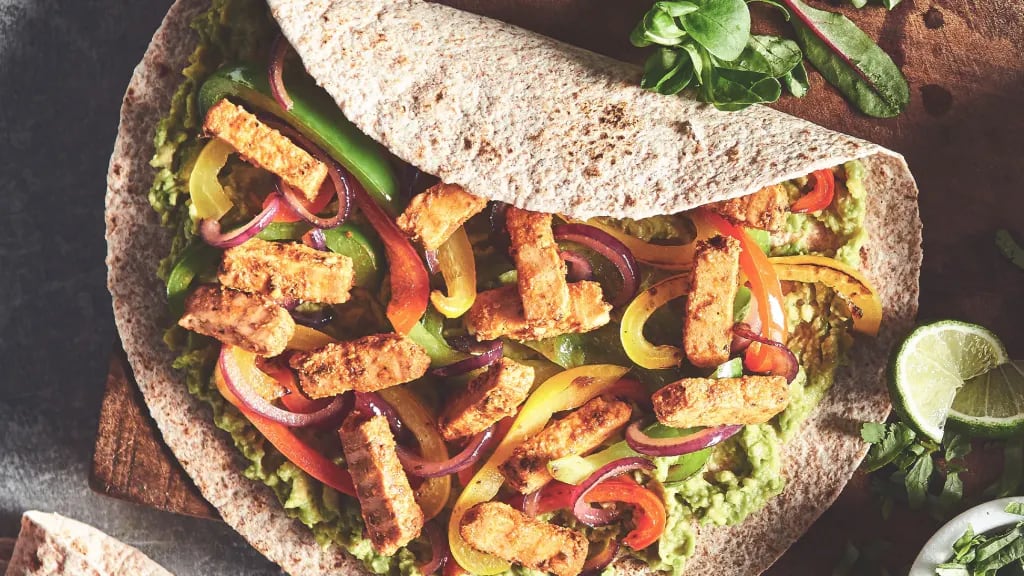The Advertising Standards Authority (ASA) has banned a television advert from the world’s largest meat alternative brand, Marlow Foods-owned Quorn.
In the advert, a woman is eating a pot of Quorn Thai Wonder Grains surrounded by work colleagues. A voiceover states: “I care about climate change and I love my food. So new Quorn Thai Wonder Grains is a step in the right direction because it helps us reduce our carbon footprint and that’s got to be good.”
“If you care about climate change,” the voiceover continues, “take a step in the right direction with new Quorn Wonder Grains. Find us in the lunch pots aisle.”
On-screen text reads: “Quorn Wonder Grains. Awarded Carbon Reduction Footprint certification by the Carbon Trust for the full life cycle of the product.”
When the advert aired in April 2020, the ASA received 32 complaints from consumers challenging whether claims that the product could help reduce their carbon footprint and had a beneficial effect on climate change were misleading and could be substantiated.
Quorn responds
In January 2020, Quorn announced plans to introduce carbon footprint data for 60% of its product volume. Specifically, the brand committed to making ‘farm to shop’ carbon footprint data, certified by the Carbon Trust, available for its top 30 selling products.
To begin with, this included the brand’s most popular and long-standing lines, such as Quorn Mince, Quorn Crispy Nuggets, and Quorn Sausages, as well as more recent innovations including its Quorn Wonder Grains. The pot of mycoprotein pieces, mixed with rice and peppers, as well as a coconut and lemongrass sauce, first rolled out in 2019.
According to Marlow Foods, the Wonder Grains product was certified by the Carbon Trust as ‘Cradle to Grave’ for its full lifecycle. Its carbon label is 3.4kg CO₂ per kg.
The footprint protocol not only certified Quorn product results, it said, but continued the brand’s commitment to reduce the product’s carbon emissions.
Directing the ASA’s attention to advert’s on-screen text, which states that the product has been awarded the Carbon Reduction Footprint certification, Marlow Foods said that by signing up to the carbon footprint protocol they had a continued commitment to reduce the carbon emission of the product. Therefore, the brand would be, over time, helping viewers reduce their carbon footprint.
ASA: ‘Advert likely to mislead’
For the ASA, however, the advert was unclear. According to the UK Code of Broadcast Advertising (BCAP Code), environmental claims ‘must be clear’. “Unqualified claims could mislead if they omitted significant information. Comparative claims could be justified if the basis of the comparison was clear,” explained the ASA.
The watchdog took issue with the advert’s failure to clarify the claim ‘helps us reduce our carbon footprint’ and considered that the basis of the reduction was likely to be material information which consumers would need in order to make an informed decision.
“Because [neither the advert nor the on-screen text] clarified what the claimed reduction of the carbon footprint was being measured against, viewers would not know on what this reduction was based.”
While the ASA understood that Quorn had measured the carbon footprint of the product and was committed to continue to reduce its footprint – which would mean that over time, if individuals continued to consume the product, they would reduce their footprint – it did not judge this to be clear from the ad.
Rather, the watchdog believed viewers would interpret the claim as a comparison against one or more other, similar, products – meaning that if a consumer chose a Quorn Thai Wonder Grains pot over a different product, they could reduce their carbon footprint immediately. As a result, the ASA concluded the advert was ‘likely to mislead’.
Quorn ‘disappointed’ with outcome
Having breached BCAP Code rules 3.1 (misleading advertising), 3.9 (substantiation), and 9.2 and 9.4 (environmental claims), the ASA told Marlow Foods to ensure the basis of any environmental claims were made clear, and did not mislead by omitting material information from their ads.
Following up with Quorn, the brand confirmed the advertisement ‘does not form part of our future communications plans’.
The company is ‘naturally disappointed’ by the ASA’s rulings, it said, adding that “it was never our intention to mislead consumers.
“Our Quorn Wonder Grains product has achieved Carbon Footprint Reduction certification from the Carbon Trust, and we feel this widely recognised and independent certification justified the claim made in the advertisement”.




